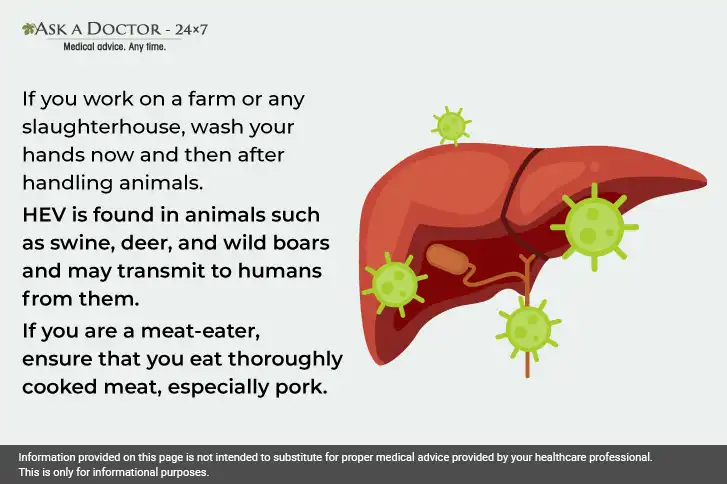All About Hepatitis E
Hepatitis refers to an inflammatory liver condition. Though viruses remain the main cause of hepatitis; alcohol or drug intake, some medications, or even autoimmune conditions may result in hepatitis. One must know about hepatitis types, their causes, symptoms, and preventive measures to stay safe from these inflammatory liver conditions.
Viral hepatitis, caused by viral invasion into the body, has five main types. Each type is caused by a different viral strain – A, B, C, D, or E. These strains differ in degree of pathogenicity and modes of transmission. ‘Hepatitis E,’ caused by the hepatitis E virus (HEV) is a common cause of acute viral hepatitis worldwide especially in those parts of the world where sanitation facilities are inadequate.
Let us learn more about hepatitis E in this blog.
How Does the Hepatitis E Virus (HEV) Spread?
HEV infects both humans and other animal species. People in regular contact with animals, particularly pigs or deer may inherit infection from the infected animals.
In humans, HEV is transmitted through the fecal-oral route. The virus is found in the stools of infected people. Food or more commonly water coming in contact with the feces of infected people gets contaminated.
Consumption of contaminated food or water causes illness in other people.
This usually occurs in middle-income countries or states with limited clean drinking water supplies, inappropriate drainage systems, poor sanitation, or insufficient health services. However, few genotypes of HEV are prevalent in high-income and well-developed countries.
Who is at Higher Risk of Getting Hepatitis E Infection?

People who are prone to develop Hepatitis E include those:
- Residing in areas with insufficient clean drinking water supply and poor drainage systems.
- Working in slaughterhouses or animal farms.
- Taking a higher intake of undercooked or raw meat.
- Having weak immune systems.
Besides above, pregnant women and travelers to countries with unhygienic sanitation facilities are also at a higher risk of getting Hep-E.
What are the Symptoms of Hepatitis E?
Fortunately, most of the HEV-infected people, especially young children, do not show any significant symptoms. For those who show, symptoms usually appear within 2 to 6 weeks of exposure to HEV and may include:
- Tiredness or fatigue
- Loss of appetite
- Abdominal or joint pain
- Nausea or stomach pain
- Itching or skin rashes
- Yellow skin or eyes, Jaundice
- Dark-colored urine or clay-colored stools
- Low-grade fever
How is Hepatitis E Diagnosed?
If you live in an improperly sanitized environment or have traveled to any such place in the past 14 to 70 days, getting any of the above symptoms could be an indication of the HEV infection.
You should consult your health care provider who may suggest you take blood tests to detect antibodies against HEV in blood. Liver function tests may also be advised to find the degree of inflammation in the liver. In areas with infrequent chances of HEV, RT-PCR may also be advised to confirm the findings of the test.
What Are the Treatment Options Advised for Hepatitis E?
No specific treatment for hepatitis E is recommended as yet. Patients are only prescribed supportive care and treated to manage the symptoms caused by HEV infection. People who get infected mostly recover on their own without requiring any specified treatment except for those who are pregnant or have weak immune systems.
Preventive measures to lower the risk of HEV infection
So far, no approved vaccine is available to prevent Hepatitis E. In this condition, adequate steps should be taken to lower the risk for hepatitis E at individual and administrative levels.
- Avoid eating raw or undercooked meat.
- Always use treated or boiled water to drink, cook, or wash dishes, especially in improperly sanitized places.
- Travelers to areas with outbursts of hepatitis E should use bottled or treated water.
- Pregnant women should strictly practice safe food and water habits.
- HEV-infected mothers should not breastfeed their infants.
- Potential blood donors in endemic areas should be screened for hepatitis E virus
- Local governments should take essential steps to maintain drinking water supply and sewage disposal standards.
A healthy liver is essential to maintain good health. Hepatitis E impairs liver function and occasionally the consequences could be chronic or fatal. Hepatitis prevention should be on the priority list of the governments to prevent any emergency outbursts or chronic disease persistence in any area. With no approved vaccination available against hepatitis E as of now, it becomes indispensable to take every possible step to reduce the risk of HEV infection at the individual level.
To get more information on hepatitis E or liver-related issues, Ask a Hepatologist online. You can also get a second opinion on your doctor's prescription or medical reports to doubly clarify your doubts and concerns from top globally accredited specialists at Ask a Doctor 24x7.
Recently Answered Queries Related to Hepatitis E
- Is There Any Chance Of Contacting Hepatitis E In The Future Pregnancy?
- Recovering From Hepatitis E. Diet Advice?
- What Does My Lab Test Report Indicate?
- Is It Advisable To Eat Meat While Recovering From Jaundice?
- Suggest Treatment For Hepatitis E
- Suggest Diet For Hepatitis E Infected Patient
- What Causes Fluctuation In Bilirubin?
Disclaimer: Information provided on this page is not intended to substitute for proper medical advice provided by your healthcare professional. This is only for informational purposes.
Ask a Specialist
Recent Questions


